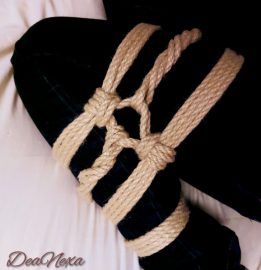As someone with long covid, my pain and energy levels have been drastically affected by the virus. It’s tricky because they are still trying to understand the disease and how it relates to other conditions like CFS/ME, MCAS, POTS and fibromyalgia. A lot of people in our community are affected by chronic pain and associated and other problems. So I thought I’d put together my thoughts on this.
The advice I have is based on my personal experience. I’m not a trained medical professional, so please speak to your doctor and/or healthcare professional to learn about your body and how best to engage with rope to minimise any negative impacts.
1. Spoon Theory – I adopt spoon theory which has helped me the most. But the spoons aren’t always predictable and how much energy is used up varies. But I do try to plan scenes as best I can. Slowing down or stopping is always a good option, if I feel my energy dips below my comfort level. Equally, I find rope gives spoons, like other positive experiences. It takes physically and mentally, but feelings of mindful presence and connectivity to my body being beautiful. And I’m doing what I love, just in little bits, so I’m not too distant to the me that was pre-covid.
2. Sensory Overload – It also helps to not go to places with too much sensory stimulation, especially if there’s loud music or people that talk a lot as conversations can be exhausting. So consider asking event hosts what the layout is sad what music might be played.
3. Manage Stressful Situations – Stress is part of life and isn’t necessarily a bad thing. But some situations cause more phyisical and mental stress which will effect your energy levels and ability to manage pain. So avoid stressful scenarios that are optional in your life. We need to work to pay the bills, and to look after dependants. Rope and kink can (and should) be focused on calmness and fun. I have tips to manage Stress in my book Rope Happy (Available in most Amazon stores)
4. Focus On Yourself – Doing rope inside your body, rather than being focused on what others are doing or what is perceived as the way rope should look. Everyone can access rope and will look different. Embrace that, no matter what other people say. This shift in focus encourages me to think as a rigger and self tier to remember what rope is to me, a very personally expressive experience betweenme and my bottom or myself.
5. Choose Understanding People – I value the people that respect my disability hugely. I’ve spent time nurturing existing long term dynamics rather than finding new partners that bring new complexities (not a bad thing, just tricky for me). If you do find new people, notice if they are pressuring you to do things you are either not ready for or capable of doing. That sort of behaviour is disrespectful. Find better people.
6. Get Therapy – Coming to terms with long term health problems is very difficult. I accessed help from my gestalt/humanist focused therapist which helps with my mindfulness practice around rope and life in general. Whatever style of therapy you choose, managing the emotional and mental aspects of long term pain and illness can help you feel more positive and find ways to do rope without causing you emotional problems.
7. Understanding Pain – know pain ebs and flows from moment to moment. When I practice meditation, I can scan my body and notice the pain and the pain that exists from the emotional tension around it. It can have different textures and heat, too. Learning to find techniques to manage pain and how it affects your body is really important, so discuss this with your doctor or health care professional. Phyisical self awareness is so important, as this will inform your risk profile as you engage with others or yourself with rope.
8. Pain Isn’t A Bad Thing – pain tells you when something is wrong. Pain is part of human existence, in one form or another. Yet there is so much shame attached to it in many cultures. Instead, celebrate the changes in you and what your beautiful body is. I have had to work to overcome the internalised shame of being disabled. I have come to appreciate pain is part of the rich tapestry of life, and it has taught me another level of humanity. Sometimes, pain reminds us we are all connected and leads us to become more compassionate to others that suffer.
I hope these tips help. If you have any others, please comment below.
(Written after listening to a podcast posted here https://fetlife.com/users/7370142/posts/7666588 by @RopePodcast – thank you for the inspiration)
Cover image: self tie futomono legbinder (design by Veritasia), natural jute on black demin, both robust natural materials for a feeling of being strongly held. All work by Dea Nexa.
Additional Resources
CFS/ME support
https://meassociation.org.uk/information-and-support-line/
Your Covid Recovery:
https://www.yourcovidrecovery.nhs.uk/
https://www.nhs.uk/live-well/healthy-body/how-to-get-nhs-help-for-your-pain/
Mental Health Support:
